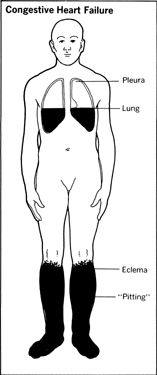Heart Disease - Congestive heart failure
Heart failure may be found in conjunction with any disease of the heart—coronary artery disease, hypertension, rheumatic heart disease, or congenital defects. It occurs when the heart's ability to pump blood has been weakened by disease. To say the heart has failed, however, does not mean it has stopped beating. The heart muscle continues to contract, but it lacks the strength to keep blood circulating normally throughout the body. Physicians sometimes refer to the condition as cardiac insufficiency or dropsy , although the latter term is seldom heard anymore.
When the heart fails to pump efficiently, the flow slows down, causing blood returning to the heart through the veins to back up. Some of the fluid in the blood is forced out through the thin walls of small blood vessels into surrounding tissues. Here the fluid piles up, or congests.
The result may be swelling, or edema , which can occur in many parts of the body but is most commonly seen in the legs and ankles. Fluids sometimes collect in the lungs, interfering with breathing and making the person short of breath. Heart failure also affects the ability of the kidneys to rid the body of sodium and water. Fluid retained in this way adds to the edema.

Treatment
Treatment usually includes a combination of rest, drugs, diet, and restricted daily activity. Digitalis , in one of its many forms, is usually given to strengthen the action of the heart muscle. It also slows a rapid heartbeat, helps decrease heart enlargement, and promotes secretion of excess fluids. Care must be taken to find the right dose, because this will vary from person to person. When edema is present, diuretics are prescribed to speed up the elimination of excess salt and water. Many improved diuretics are available today. A sodium-restricted diet is generally necessary to reduce or prevent edema. Patients will also probably need bed rest for a while, with gradual return to slower-paced activity.
Most important, however, is the adequate treatment of the underlying disease that led to heart failure in the first place.

Comment about this article, ask questions, or add new information about this topic: